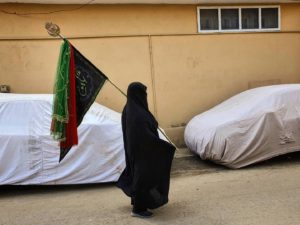
After the recent anti-Shia wave in Pakistan, the Shia community vows to come out in record numbers on the day of Arbaeen. Meanwhile, religious extremists have been campaigning for a ban on peaceful processions and a restriction on the right to practice religion.
The day of Arbaeen marks the culmination of a 40-day mourning period for the merciless martyrdom of Imam Hussain (the grandson of Holy Prophet Muhammad peace be upon him) in 680AD. The day holds supreme significance for the global Shia community as a time of tribute to the sacrifice of Imam Hussain for social justice.
Typically, people come out in large numbers and march over kilometers as part of Arbaeen processions across the world, including Pakistan. The precariously changing political landscape of Pakistan has led to a stronger religious fervour with which this ritual will be observed this year.
The recent rallies held by members of the ‘majority’ sect (Sunnis) and the “biased” behavior of the administration motivated the Shia community to come out on the day of Arbaeen as a show of numerical strength. Foreseeably, the Shias are expected to join the Arbaeen processions in huge numbers from every locality in the country.
On the other hand, clerics from some Sunni schools of thought have been demanding a ban on the Arbaeen procession as well as all the other marches held by the Shias as part of their religious practice. A famous Deobandi scholar Mufti Taqi Usmani asked the Government in one of the anti-Shia marches in Karachi to impose a strict ban on the processions. Why? Because according to him these processions do not constitute an ‘integral part of the Shia faith’.
He went on to say in the demand letter that the processions disrupt the economic activities of the citizens and cause a law and order situation in the country. Ironically, when this demand document was being read out participants of the rally blocked one of the busiest roads (Shahrah e Quaideen, Karachi) and attacked a Shia Mosque.
Similarly, a famous Barelvi scholar who has been the Chairman of Ruet-e-Hilal (moon-sighting) Committee, Mufti Muneeb Ur Rehman has been quite vocal against the Shia community. While addressing a large rally he demanded that an addition be made to the census form that asks for the sect of each person in Pakistan.
Interesting to note how Mufti Muneeb an otherwise moderate scholar, is seen standing in the same row as the extremists when demanding restrictions on the religious freedom of the sect constituting a 20 percent population of Pakistan. Analysts believe that Mufti Muneeb has political gains insight while he participates in anti-Shia rallies.
Moreover, it could be a tactic to stay relevant for the people after he had been entirely cut off from the mainstream politics due to the rift with Minister of Science, Fawad Chaudhry after the notion of his removal from the chairmanship of the Ruet-e-Hilal Committee.
The demands of banning the Shia processions or shifting them to the outskirts of cities have been surfacing for quite a few years now. Inconvenience caused by the closure of few roads, market places, mobile networks on the procession days is presented as the pretext for similar demands in the past too. But the high tensions this year around have given a rise to the emotional sentiments of both sides.

On 5th September, a press release was shared on social media by Sunni Action Committee to pressurize the administrative bodies to cancel all the Arbaeen processions as the Sunni sect feels ‘threatened and unsafe’. The very next day, a notification was issued by the Government of Sindh in which strict action was promised against any new procession taken out in the province on the day of Arbaeen.

The Shia community is being marginalized through this wave of hatred and intolerance specifically weeks before the days of Ashura and Arbaeen. The community feels that the demands by Sunni leaders to limit the Shia practices are a direct attack on their freedom of practicing religion. They maintain that the processions are being taken out for centuries and all the extra security arrangements are recently ensured by the government after attacks on the processions.
Instead of objecting to the practice of peaceful processions, the community urges and invites the majority sect to join them to remember the historical sacrifice of Imam Hussain for social justice and human dignity. For Shias, it is a constitutional right to freely practice their religion and they wish to continue doing so even exposed to high threats. The Railway Minister, Shaikh Rashid mentioned in a recent conference soaring scale of the threat to the Arbaeen 2020 processions in Pakistan.

A few from those opposing Arbaeen 2020 might have religious reasons melting into the central bifurcation between the history of Caliphate (Sunnis) and Imamat (Shias). Another faction seems to have political gains from the anti-Shia campaigning as discussed. The reasons vary on a spectrum of possibilities but the opposition is alarming for the sectarian sensitivities.
With the current sectarian tensions at an all-time high in Pakistan, the day of Arbaeen brings a challenge for law enforcement agencies to maintain peace in the country. Notwithstanding the importance of this day, the genocidal threat lurking in the shadows surrounding the central Arbaeen processions is an unsettling reality for Shias.

